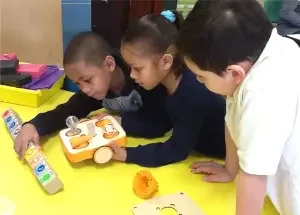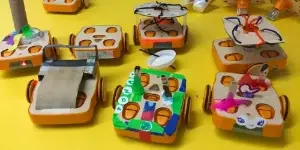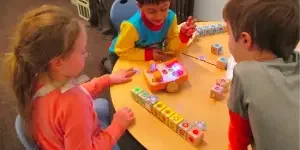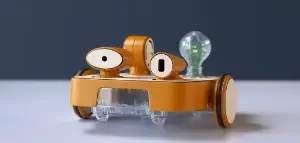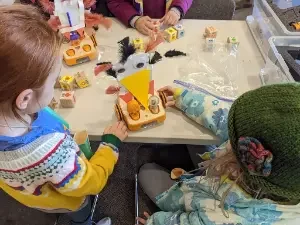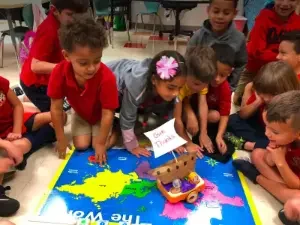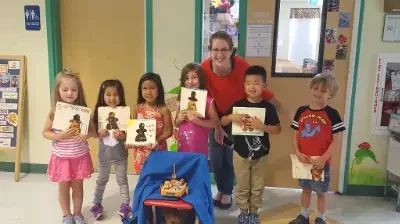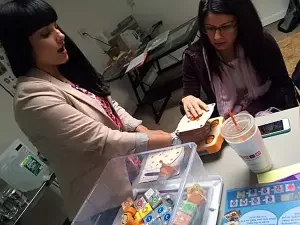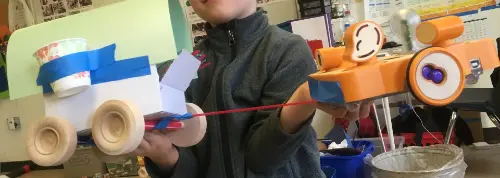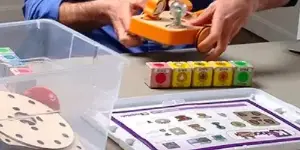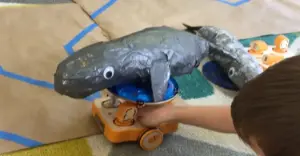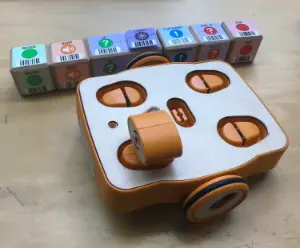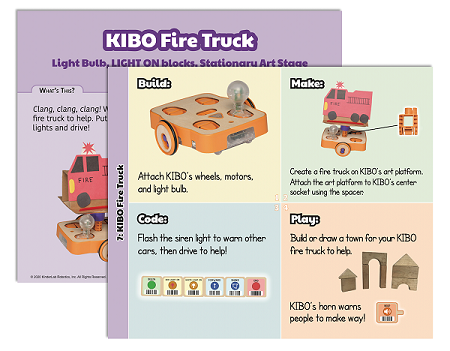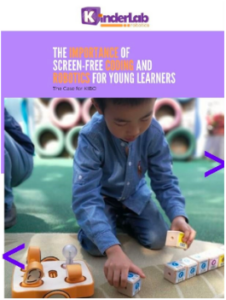Innovative KIBO Robot Curriculum and Products for Early STEAM Learning
Expanding Teachers’ Options in the Classroom with Enhanced Suite of Curriculum and Products
(Waltham, MA) October 1, 2021 – KinderLab Robotics announces further enhancements to their product and curiculum offerings to enhance KIBO Classroom Packages. With the KIBO™ classroom packages educators get the right number of KIBOs, valuable training, and hours of curriculum, workbooks, and more. KIBO is the award-winning educational robot kit that introduces screen-free STEAM coding to young learners in PreK–2nd grade.
To expand teachers’ options in the classroom, KinderLab Robotics has enhanced its KIBO™ curriculum suite with three new and improved resources: KIBO Activity Cards, revised KIBO Assessment Workbooks, and KIBO Costumes, where children decorate a set of “face-plates” and attach them to their robot. These options build upon KinderLab’s existing 160+ hours of curriculum for KIBO covering programming, STEAM, computational thinking, and engineering design process.
KIBO Activity Cards provide 15 “stations” with colorful images and easy-to-follow instructions, which can be used independently by students, as the basis for teacher-guided lessons, or when playing and learning with KIBO at home. Each card provides out-of-the-box guidance and inspiration on using KIBO and invites children into a different creative, imaginative activity that combines coding, building, art, and play.
KIBO Assessment Workbooks help teache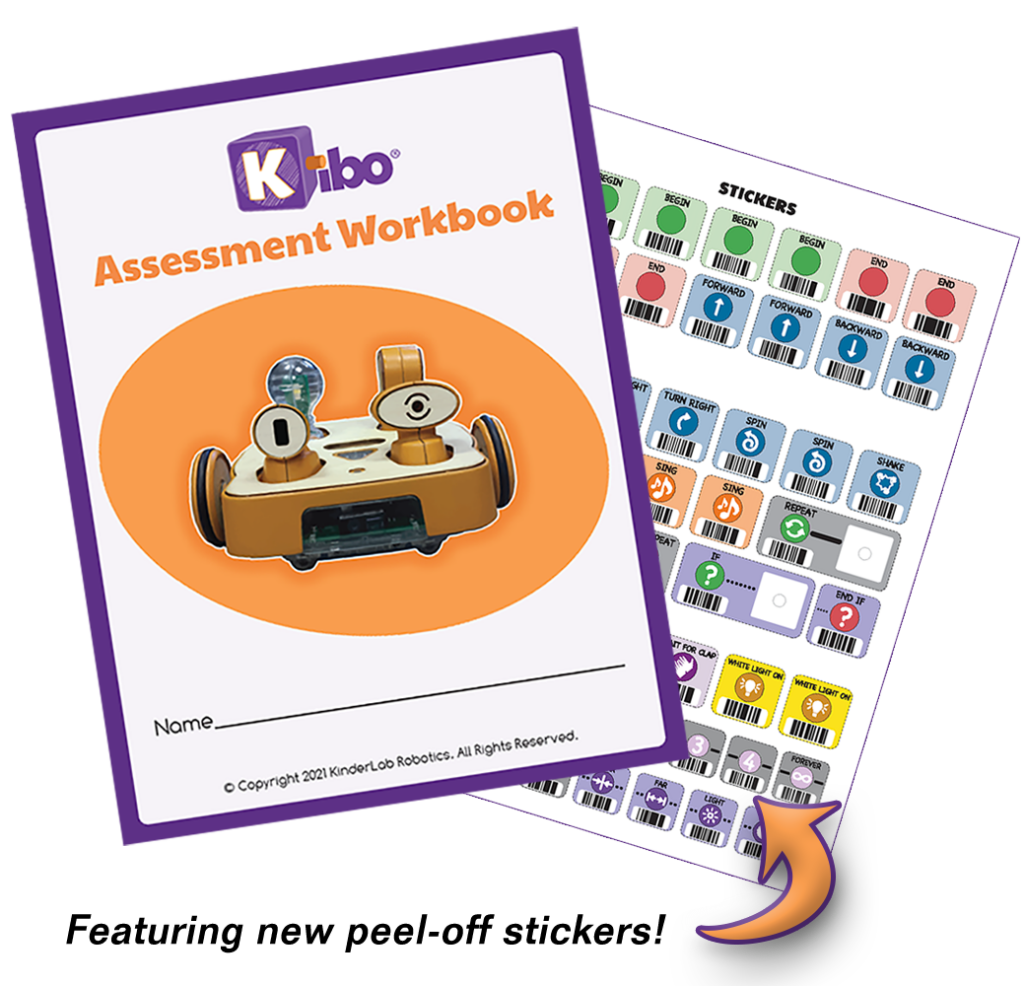 rs evaluate students’ learning with a focus on programming, robotics concepts, and the engineering design process. The new edition of KIBO assessments allow children to solve fun story problems with easy-to-use KIBO command stickers, letting even pre-readers to use the assessments. The Second Edition introduces pre-cut, peel-off KIBO block stickers for children to use when solving the programming challenges in the Workbook. These new sticker sheets make the assessments much easier to deliver in a busy classroom!
rs evaluate students’ learning with a focus on programming, robotics concepts, and the engineering design process. The new edition of KIBO assessments allow children to solve fun story problems with easy-to-use KIBO command stickers, letting even pre-readers to use the assessments. The Second Edition introduces pre-cut, peel-off KIBO block stickers for children to use when solving the programming challenges in the Workbook. These new sticker sheets make the assessments much easier to deliver in a busy classroom!
KIBO Costumes are paper cut-outs w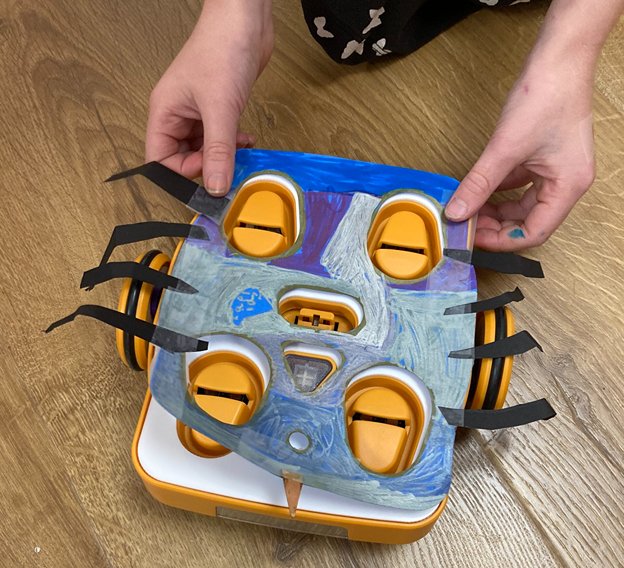 hich cover KIBO’s top, designed so students can draw on the costume with crayons, markers, pens, turning their robot into whatever character they imagine. Is KIBO a bug? A super-hero with crazy green hair? A storybook character? Educators can use these costumes to support cross-curricular engagement, freeing students to transform their KIBO and bring the subject matter to life.
hich cover KIBO’s top, designed so students can draw on the costume with crayons, markers, pens, turning their robot into whatever character they imagine. Is KIBO a bug? A super-hero with crazy green hair? A storybook character? Educators can use these costumes to support cross-curricular engagement, freeing students to transform their KIBO and bring the subject matter to life.
What makes KIBO, its curriculum, and full suite of products different?
1) Based on 20 years of early child development research by Dr. Marina Bers and her team at Boston College’s Devtech Research Group, KIBO is a completely screen-free way to introduce coding and robotics, years of providing innovative STEM solutions nationwide and in over 60 countries, and the thousands of students and educators using KIBO.
2) KIBO, the hands-on robot, engages young students to learn STEAM concepts through play and creative self-expression. KIBO is an open coding and robotic platform that can be easily integrated into existing curriculum.
3) Since 2013, KIBO has been a way for young learners in PreK–2nd grade to start their journey into STEAM. KIBO introduces developmentally appropriate robotics and coding into early childhood education: teaching computer science, engineering, and computational thinking to young children.
4) KinderLab’s complete suite of curriculum helps educators incorporate STEAM elements into a wide range of curricula, including art, cultural studies, and reading literacy. 160+ hours of standards-aligned lesson plans and curriculum in robotics, coding, and computational thinking are aligned with both ISTE and CSTA standards in computer science and engineering, and support deep cross-curricular connections to science, ELA, math, and social studies.
5) Researchers recognize that young children think and learn best when moving, playing, building, and engaging with concrete objects. Traditional coding is often screen-based and abstract. But with KIBO, coding is screen-free, where children program their robot by sequencing physical wooden blocks, turning coding into something tangible.
Evidence that supports the effectiveness of KIBO and its curriculum
Research shows that even the youngest students can learn sequencing and coding in a fun and engaging way. Specific, powerful, and positive learning outcomes for young learners when working with KIBO robotics include:
• Improved sequencing ability in early childhood
• Mastery of foundational coding and robotics skills
• STEAM success through Integration of robotics across curricula
• Positive impact on underrepresented groups in STEM fields
See the 20+ years of research behind KIBO.
About KIBO – The Playful STEAM Robot
KIBO is a robot kit that allows children aged 4–10 to build, program, decorate, and bring their own robot to life without requiring any screen time on a smartphone, tablet, or computer. With art and building, students transform KIBO into imagined animals, vehicles, storybook characters, and more. When children create their own robot, they perceive it as play, but they are learning invaluable STEAM skills. Not only are these hands-on experiences inherently rewarding, but they help children understand the technology in their world and can even improve their future job prospects.
About KinderLab Robotics
KinderLab Robotics is the creator of the award-winning KIBO, a playful educational STEAM robot kit based on 20 years of child development research with thousands of children, teachers, and parents. Developed specifically for teachers by Dr. Marina Umaschi Bers at Tufts University, KIBO is currently used in 60+ countries and has proven efficacy in helping kids learn STEAM—and getting them excited about it! KinderLab offers a complete suite of teaching materials that help integrate STEAM elements into a wide range of curricula, including art, cultural studies, and reading literacy. For more information, please visit KinderLabRobotics.com.
Press Contact
Chris Piehler
PR with Panache!
Chris@PRwithPanache.com

